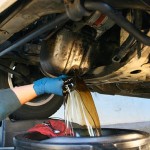Engine Oil - Your Car’s Lifeblood
 With so much already on your daily plate, it’s no wonder that your car’s engine oil may be one of those things that’s “out of sight, out of mind.” As long as the car’s running, why worry? But, engine oil really is your car’s lifeblood and shouldn’t be taken for granted.
With so much already on your daily plate, it’s no wonder that your car’s engine oil may be one of those things that’s “out of sight, out of mind.” As long as the car’s running, why worry? But, engine oil really is your car’s lifeblood and shouldn’t be taken for granted.
As you might expect, the engine oil provides lubrication for the moving parts inside internal combustion engines. But that’s not all it does. Engine oil fulfills a number of other functions.
To begin with, engine oil captures dirt particles and fuel vapors, and holds them in suspension, away from moving parts inside the engine. It also provides additional cooling for some of those components. It even helps operate the valve train in engines that use hydraulic lifters to open the valves.
With all it does, it’s no wonder that regular oil changes are critical for engine durability. In fact, no other maintenance item is so important for extending the vehicle’s life and reducing repair costs. Changing the oil has these direct effects for protecting the engine:
- It removes harmful vapors that build up in the crankcase during combustion.
- It eliminates particles of carbon and dirt that build up during normal operation.
- It replaces depleted additives designed to reduce friction and wear.
- It renews oil viscosity, or thickness, to improve lubrication.
But not all of the benefits of changing oil are due directly to the oil itself. That’s because during a typical oil change — the familiar ‘‘lube, oil and filter’’ service — the service technician usually checks a number of other items and performs other services on the car:
- Lubricates the suspension and steering, and checks for obvious wear or damage.
- Examines the underside for leaks or other obvious problems.
- Checks the oil levels in the differential and manual transmission.
- Checks all under-the-hood fluid levels.
- Checks belts and hoses.
- Checks the air filter.
Depending on where you go, the technician may perform several other checks and services as part of a normal oil change procedure. That’s why regular oil changes are so important: not just for the new oil — a valuable consideration in itself — but also for the other checks and tests that get performed at the same time.
Replace the Filter with Every Oil Change
Many people still believe in replacing the oil filter during every other oil change. They figure they’re saving money on the filter, plus the extra oil.
But what are they really saving? If they change their oil four times a year, that’s two filters and a quart or two of oil they end up saving. At today’s prices, that works out to somewhere between $15 and $20 a year.
But what are they giving up? To begin with, the old oil filter is at least partially clogged — not a good thing. What’s more, they’re leaving about 20 percent of the old, dirty oil in the engine. So for a savings of $20 or less a year — or about 5 cents a day — they’re risking the most expensive single component on their cars — the engine.
As an old ad used to say on this very subject, ‘‘You can pay me now, or pay me later.’’ Pay them now: Replace the filter every time you have the oil changed.
And, add regular oil changes to your to-do list – it could save you time and money, later.
Source: AAA Auto Guide – Making Sense of Car Care (2001)
















